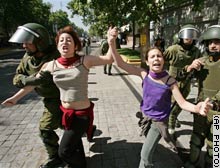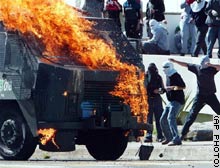Free trade deals dominate APEC
Thursday, November 18, 2004 Posted: 0339 GMT (1139 HKT)
http://edition.cnn.com/2004/WORLD/americas/11/17/apec.preview.ap/index.html
|
Observers estimate about 120 protesters were taken away by police in buses.
Many protesters were opposed to the war in Iraq and economic globalization. |
SANTIAGO, Chile (AP) — Chile and Japan have announced plans to begin preliminary talks towards negotiating a free trade agreement.
Wednesday's announcement, made during the annual Asia-Pacific Economic Cooperation forum in Chile, came after a meeting between Chilean Foreign Minister Ignacio Walker and Japanese counterpart Nobutaka Machimura.
The two ministers also discussed Japan's ambitions for a permanent seat on the United Nations Security Council, officials said.
A future trade agreement could expand the already vigorous trade between Japan and Chile.
In the third quarter of the year, Chilean exports — such as minerals, fish and paper products — to Japan reached $2.7 billion, while imports totalled $565 million.
Chile has numerous bilateral free trade agreements, including accords with the United States, South Korea and the European Union.
The United States and Australia also announced that they have overcome last minute differences to strike a free trade deal that will go into effect on January 1, 2005.
APEC foreign ministers and trade ministers were holding meetings Wednesday and Thursday on issues ranging from fighting terrorism and corruption to a proposal to create a free trade area that would link the Americas to Asia.
Australian Trade Minister Mark Vaile said the APEC ministers had a productive round Wednesday on moves to liberalize world trade ahead of a World Trade Organization meeting in Hong Kong in December 2005.
The APEC Business Advisory Council, the group's business lobby, has also asked the group to consider creating a Free Trade Area of the Asia-Pacific that would stretch from China to California and from Australia to Chile's southern tip.
Business leaders want a task force established to study the issue, but a trade zone spanning the Pacific Ocean would take years to create.
APEC, which represents the United States, Canada, Japan, Russia, China and most southeastern Asian economies, accounts for more than half of the world's trade.
APEC has been working for years on a plan to reduce tariffs among developed countries in the group by 2010 and among developing member nations by 2020.
Critics say member economies have made little progress toward these goals.
Earlier, angry protesters opposed to the summit and U.S. President George W. Bush's upcoming attendence, battled police for hours, hurling rocks at officers who responded with tear gas and water cannon blasts.
The confrontations occurred kilometers (miles) from the site of the forum when about 500 anti-Bush and anti-globalization demonstrators tried to hold an unauthorized march on the eight-lane Alameda avenue in the Chilean capital.
They were met by officers who doused them with tear gas from fast-moving jeeps and knocked them down with streams of water from military-style trucks as pedestrians ran for cover and businesses shut their doors.
Security stepped up
After being repulsed, the crowd of mostly university students fled but managed to regroup, shutting down traffic and yelling, "Get out of here, Bush," and "We don't want to be an American colony."
Bush is to meet with other APEC leaders, including Chinese Premier Hu Jintao and Japanese Prime Minister Junichiro Koizumi, at the summit this weekend.
Several bilateral meetings between leaders are planned, including one Saturday between Hu and Koizumi. Ties between Japan and China have been strained by the incursion of a Chinese nuclear submarine into Japanese waters last week.
There was no immediate report of injuries from the clashes on the streets of Santiago, but the state-run TVN television network said 120 protesters were taken away in buses. Among those detained and later released was Rodrigo Soto, who heads Amnesty International's Chile office.
Security has been stepped up across the capital in anticipation of the summit, which will take place from Friday through to Sunday.
About 4,000 police have been deployed in the city of 5.5 million, with 1,000 more ready to be called up if needed.
Chilean President Ricardo Lagos has urged demonstrators to "protest in a civilized manner."
APEC's members are Australia, Brunei, Canada, Chile, China, Hong Kong, Indonesia, Japan, Korea, Malaysia, Mexico, New Zealand, Papua New Guinea, Peru, the Philippines, Russia, Singapore, South Korea, Taiwan, Thailand, the United States and Vietnam.

